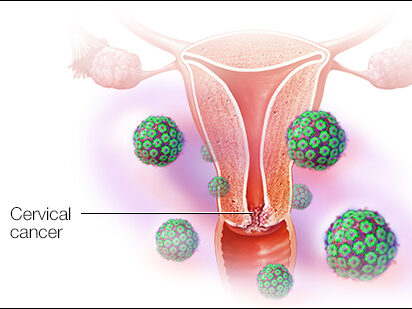What is Cervical Cancer?
Cervical cancer occurs when the cells of the cervix the lower part of the uterus that connects to the vagina – begin to grow abnormally and form cancerous changes.
Early detection through regular screening can completely prevent cervical cancer. It’s one of the few cancers that is largely preventable with routine Pap smears, HPV vaccination, and timely medical care.

How Does Cervical Cancer Develop?
The most common cause of cervical cancer is persistent infection with high-risk strains of the Human Papillomavirus (HPV). HPV is a very common virus transmitted through sexual contact.
In most women, the infection clears on its own, but in some, it can lead to precancerous changes in the cervix over time.
When not detected or treated early, these abnormal cells can turn cancerous — making screening and vaccination vital for prevention.
Common Symptoms of Cervical Cancer
In the early stages, cervical cancer often causes no noticeable symptoms, which is why regular screening is so important.
As it progresses, symptoms may include:
- Abnormal vaginal bleeding (between periods, after intercourse, or after menopause)
- Foul-smelling vaginal discharge
- Pelvic pain or discomfort
- Pain during intercourse
- Heavier or longer menstrual periods
If you experience any of these symptoms, please consult your gynecologist immediately.
Risk Factors
Certain factors increase the likelihood of developing cervical cancer:
- Persistent HPV infection
- Early sexual activity or multiple partners
- Weak immune system
- Smoking
- Long-term use of oral contraceptives
- Lack of regular Pap smear screening
- Family history of cervical cancer
Diagnosis at Shree Clinic
At Shree Clinic, we follow a systematic and gentle approach to screening and diagnosis to ensure women feel comfortable and informed at every step.
Common diagnostic tests include:
- Pap Smear Test: Detects early, precancerous changes in cervical cells.
- HPV DNA Test: Identifies high-risk HPV strains responsible for cervical changes.
- Colposcopy: A detailed examination of the cervix using magnification.
- Biopsy: If abnormal cells are detected, a small tissue sample is taken for further testing.
Treatment Options
Treatment depends on the stage of cancer, overall health, and fertility preferences.
1. Precancerous Changes (CIN or Dysplasia):
- Cryotherapy or laser treatment to destroy abnormal cells
- Loop Electrosurgical Excision Procedure (LEEP)
- Cone biopsy
2. Early-Stage Cervical Cancer:
- Surgical removal of cancerous tissue (conization or hysterectomy)
- Laparoscopic or minimally invasive approaches for faster recovery
3. Advanced Cervical Cancer:
- Combination of radiation therapy and chemotherapy
- Targeted and supportive therapies for pain relief and symptom control
Prevention is Better than Cure
Cervical cancer is one of the most preventable cancers in women, thanks to two simple measures:
1. Regular Pap Smear Screening
Early detection can identify abnormal changes long before cancer develops. I recommend routine screening starting from age 25 years (or earlier in high-risk cases).
2. HPV Vaccination
The HPV vaccine protects against the most common cancer-causing HPV strains. It is recommended for:
- Girls and women aged 9 to 26 years (best before sexual debut)
- Women up to 45 years (after doctor consultation)
At Shree Clinic, we offer guidance and vaccination support for young women and mothers to ensure lifelong protection.
Why Choose Shree Clinic?
At Shree Clinic, we believe in empowering women with awareness, prevention, and compassionate care. Cervical cancer prevention starts with education and regular screening — both of which we provide in a comfortable and private setting.
- Comprehensive Screening – Pap smear and HPV testing using advanced methods.
- Early Detection Expertise – Identifying changes before they become serious.
- Vaccination Guidance – Protecting girls and women from HPV-related risks.
- Compassionate Counseling – Clear explanations, privacy, and emotional support at every step.
- Trusted Experience – With over 23 years of expertise, associated with Aditya Birla Hospital, Lotus Hospital, Jupiter Hospital, Pune. Cloud Nine Hospital, Surya mother and child Hospital and Oyster and Pearls Hospital for advanced gynecologic care.
Take a Step Towards Prevention
Cervical cancer is preventable and curable when detected early.
If you’ve never had a Pap smear or HPV test, it’s time to schedule one — a simple test can save your life.
At Shree Clinic, Dr. Sonali Choudhari, offer safe, confidential, and expert preventive care to protect women’s health at every stage of life.
- Consultations available online and offline at Shree Clinic, Pune.
- Dr. Sonali Choudhari, MBBS, DGO, FICOG, Diploma in Aesthetic Gynecology
- Your partner in preventive women’s health and holistic gynecology.